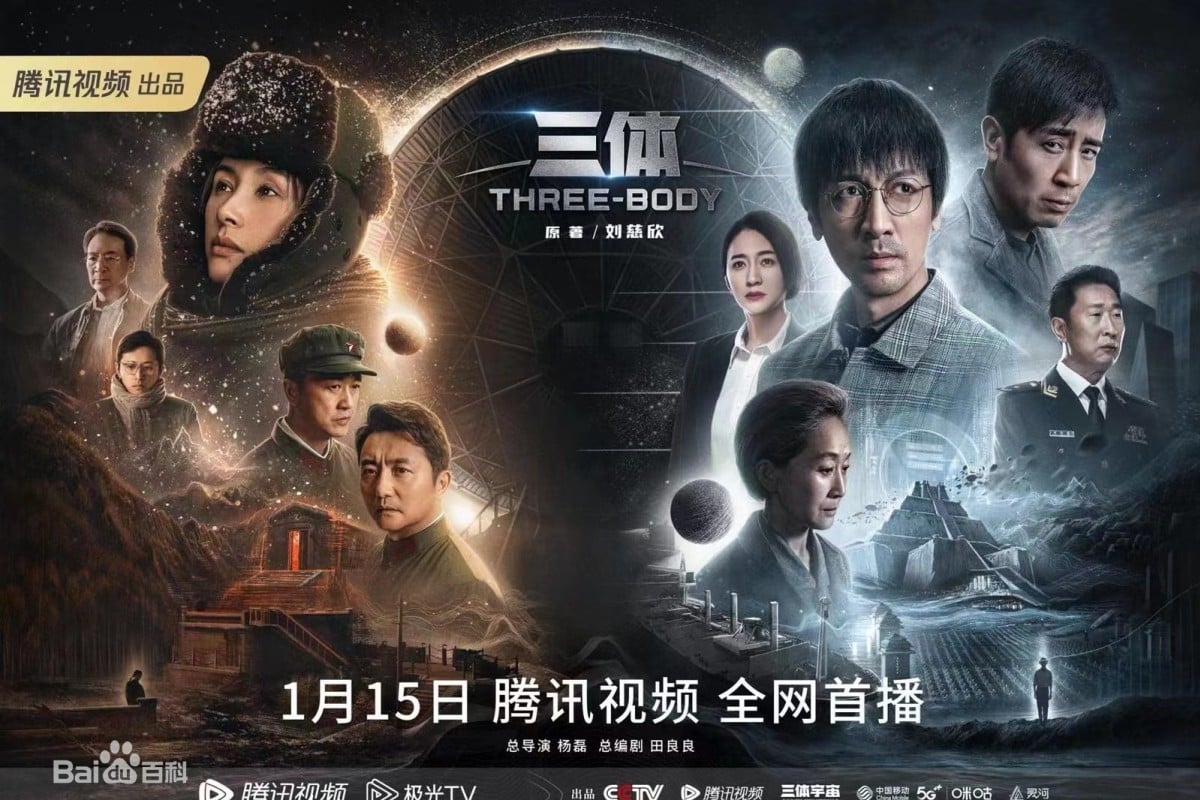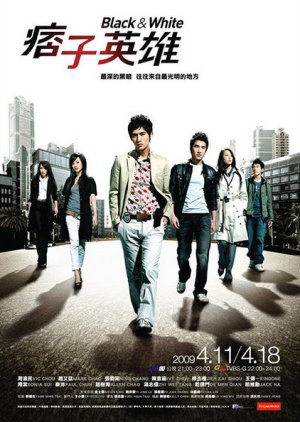TV and Treadmills
Thoughts about my favorite things (other than my family)....
Saturday, April 13, 2024
Netflix's "The 3 Body Problem" versus Tencent's "Three Body"
Thursday, October 12, 2023
"Black & White" (2009, Taiwan)
I'm always on the lookout for serialized crime thrillers, the closer to "24" the better. That means I'm looking for stories with conspiracies, moles within government agencies, tech nerd hackers, and lots of action. "Black & White" is a 2009 Taiwanese drama that hits all of those notes superbly.
It starts off with an undercover operation led by maverick cop Wu Ying-Xiong (literally, Hero Wu) to chase down the supplier of a devastating hallucinogenic drug called Dreamer. The operation goes wrong, and the bad guy gets away, in part because Wu gets stopped by another cop, Pi Zi, who just transferred to the district and doesn't know Wu is a cop. Pi Zi is a lazy cop who's more interested in hitting on good-looking women than he is in solving crimes (even though he has a stellar record). Because of the disastrous outcome -- the bad guy got away with the drugs and $100,000 that the police borrowed -- the supervisor forces Wu and Pi to work together. This part of the show is a fairly typical "Lethal Weapon" kind of buddy action-comedy.
A key character in the series is Chen Lin, the daughter of the head of the Sanlien Group, which is basically a front for a Triad branch. She becomes a part of a love triangle with Wu and Pi -- actually, it becomes more like a love pentagon or hexagon by the time you count up everyone who ends up liking someone else...
There are 24 episodes in the series (just like "24"!), and it ends satisfyingly, though there's room for more. Since it's been 14 years, though, it's not likely there will be a follow up. (There are two prequel movies.)
It's currently streaming via Netflix.
Friday, September 15, 2023
Netflix's "Sisyphus: The Myth"
Beginning in the mid-2000s, there was a particular species of TV show that emerged on American networks: pilot episode full of intriguing mysteries, with subsequent episodes adding layers of complexity, answering one question but asking more. "Lost" (ABC 2004-10) was Patient Zero of this trend, and the prime example. The hallmark of this kind of show was that it was completely addicting even as you wondered if there really was a master story behind everything, or if the writers were making stuff up as they went along.
Almost always, it was the latter. "Lost," "FlashForward" (ABC 2009-10), even "Battlestar Galactica" (SyFy 2004-09) were all this kind of show.
Apparently, non-American shows are not immune from this syndrome. We recently added Netflix in our household, and the first series I checked out was the South Korean time travel/thriller "Sisyphus: The Myth" (Netflix 2021). It's a variation on "The Terminator," where someone in our present day (in this case, an arrogant genius) creates something that is of immense importance in the future, and time travelers from the future come back to mess with the timeline (or preserve it). The main future warrior is a 25-year-old woman named Gang Seo-Hae, and the genius is 38-year-old Han Tae-Sul.
Like the aforementioned American shows, the pilot episode is packed full of intriguing questions and daring set-pieces, and ends on anxious cliffhanger. Episode 2 deepens the mystery, and even as subsequent episodes answered a few questions, they raised even more. Unfortunately, as compelling as each episode was, the whole show started to collapse from the weight of its own mysteries. The time travel rules didn't seem consistent, and in the end, none of the plot really made any sense at all. It's too bad, because the production values were quite good (the dystopian scenes of South Korea in 2035 where fantastic), and the acting was solid. I guess it just goes to show that this "make things up as you go along" style of story-telling isn't unique to Hollywood.
Monday, July 24, 2023
Paramount+'s "Rabbit Hole"
I somehow misclicked or mis-responded to Amazon's Alexa and signed up for a 7-day free trial of Paramount+. I don't have anything against Paramount+, but I'm finding all this streaming-creep to be too much, and on principle, I'm trying to stick to Amazon Prime and Disney+. Having signed up, though, even if inadvertently, I might as well maximize my free trial.
Nothing is what it seems when John Weir, master of corporate espionage, finds himself at the center of a shadowy conspiracy. After uncovering a dangerous plot by powerful forces with the ability to control populations and subvert democracy, Weir is framed for murder and put on the run, trying to figure out who and what is real in a reality turned upside down. As a man who deals in mistrust and deception, can John Weir trust a team of unlikely allies to outwit an enemy with deep ties to his past and who's bent on using our own data against us? John Weir must navigate a world of surveillance, misinformation and manipulation to uncover the man at the center of the plot and stop him before it's too late.
Friday, June 2, 2023
My ranking of John Carpenter movies
I've been eyeing the blu-ray of John Carpenter's Big Trouble in Little China, and it finally dropped to a good price on Amazon. I've seen a good number of Carpenter's flicks, although oddly enough not Halloween, which was what really put his name on the map. Anyway, I got to thinking about my personal ranking of the Carpenter movies that I've seen, and here it is:
1. The Thing (1982) -- Unquestionably the best of his movies, and it's not really close. Simply drips with paranoia, and the blood testing scene still packs a punch.
2. Big Trouble in Little China (1986) -- Really weird in a good way. I didn't realize it back in 1986 (because I was a clueless teenager) but Kurt Russell's Jack Burton isn't really the hero. He's a blundering, blustering fool, while Dennis Dun's Wang Chi is the real hero.
3. Escape from New York (1981) -- I thought this was awesome when I first saw it as a young teen (don't ask how a young teen got to watch an R-rated movie), but it doesn't hold up quite as well now.
4. They Live (1988) -- The ridiculously long fight scene between Roddy Rowdy Piper and Keith David gets all the attention, but I think it gets tiresome. The movie as a whole, though, is like a Philip K. Dick idea crossed with WWF.
5. Escape from L.A. (1996) -- Where the original made Manhattan look burned out and dystopic, the sequel turns L.A. (as a detention island for "degenerates") into a parody of Southern California living. More of a comedy than a thriller, it's nice to see Kurt Russell play Snake Plissken again, but it's so-so.
6. Black Moon Rising (1986) -- Starring a pre-Fugitive Tommy Lee Jones as an industrial thief who gets mixed up with the development team of a high tech car and Linda Hamilton's car thief, this is a pretty underrated thriller. It's very much a product of the 1980s, though.
7. Prince of Darkness (1987) -- The second in the loose "Apocalypse Trilogy" (along with The Thing and In the Mouth of Madness), this is about a group of physics grad students who investigate a container filled with a mysterious fluid that may be Satan. Pretty gory and horrific, with a killer twist ending.
8. Christine (1983) -- This was a relatively faithful version of the Stephen King novel about a demonic car. It's much more a King movie than a Carpenter one.
9. Dark Star (1974) -- Impressive for its extremely low budget, but still a low budget sci-fi flick about a space crew assigned to blow up unstable stars. Great as showcasing Carpenter's talents, but not one I need to watch again.
10. The Fog (1980) -- Dead sailors come back as ghosts to exact their revenge. Has some very good mood, but supernatural horror just isn't my cup of tea.
Wednesday, May 10, 2023
The WGA strike...
As of last week, the Writers' Guild of America (WGA) has been on strike. Shows still in production can continue with completed scripts, but there are showrunners who are members of the WGA, and some of those showrunners have stopped working altogether on their programs.
I remember 2007, the last time writers went on strike. "24" lost basically an entire year (although this seemed to work out well, as the delayed season -- number 7 -- ended up with a strong and coherent plot, possibly because the writers had close to an extra year to plan things out, rather than making it up on the fly).
Back then, streaming had not taken off, so the only "on demand" viewing was via DVDs (of older shows/seasons) or TiVo of currently airing shows. Between network and cable TV, I had a full plate of TV watching, so much so that I would sit down with the fall TV preview issue of Entertainment Weekly and plot out a grid of days and time slots to see if there were any conflicts between shows. (Yes, my original TiVo could only record one channel at a time -- the horror!)
As you can imagine (given the theme of this blog), the writers' strike left me feeling despair at the time. What would I do for entertainment?!? Reality TV (whose writing staff has a different guild) could only go so far.
Today? I kind of understand the issues involved and I certainly hope the writers can negotiate a fair deal to take into account the new economics of streaming and on demand viewing, but I don't feel anything like the existential dread that I felt 16 years ago.
The only scripted network shows that I've been TiVoing this season are NBC's "The Blacklist" and CW's "Kung Fu." (I also watched "Magnum PI" but failed to set my TiVo to record it after it moved from CBS to NBC, so I'll have to catch up on that.) "The Blacklist" is in its final season, and "Kung Fu" might not be renewed. And I got rid of cable years ago. That leaves the streaming services, where I have Amazon Prime and Disney+. The strike will definitely impact me there, but the fact of the matter is that between what's already on those streaming services*, plus a whole bunch of C-dramas available on YouTube (I just started an interesting looking one called "Stealth Walker" about an undercover female narcotics agent), and DVDs**, I'm not going to run out of things to watch for a long time.
* Season 4 of Amazon's "Jack Ryan" starts next month! And there's "Citadel," which cost something like $50 million per episode...
** I rewatched "Prison Break" earlier this year, and am just over halfway through with "Justified" right now. "Battlestar Galactica" and "24" await their turns.
Tuesday, April 11, 2023
Revisiting 90s TV: "Nowhere Man"
This was a weird, one-season show about Thomas Veil, a photographer who's just been critically lauded for a powerful picture he took that he called "Hidden Agenda," which seems to show three men being hanged. He attends a celebration in his honor with his wife, and then goes to dinner with her. When he comes back from the restroom, she's gone. He goes home and sees her there...with another man. When he tries to get inside, she doesn't seem to recognize him. What??? She's not the only one. As he soon discovers, no one seems to know who he is.
Played by Bruce Greenwood (Captain Pike in the rebooted "Star Trek" movies), Veil goes on the run, trying to unravel the mystery of who erased his life. Of course, there is a shadowy cabal behind this all, and he manages to stay barely one step ahead while making slow progress toward finding out what happened.
Like the best of these shows, every mystery is solved only temporarily, with more mysteries emerging. Paranoia is rampant through every episode, as Veil has no idea who he can trust and who is secretly working for his antagonists.
The risk for these kinds of shows is that the writers have a high concept to start with, but no idea how to wrap it up (ahem, "Lost"...). "Nowhere Man" lasted only one season, but news of its cancellation came with enough lead time that the show has a definitive series finale that satisfactorily explains everything.Definitely worth checking out if you like this kind of paranoia-driven serialized drama.

:format(webp)/cdn.vox-cdn.com/uploads/chorus_image/image/73219894/3bodyproblemadapt_netflix_getty_ringer.0.jpg)




